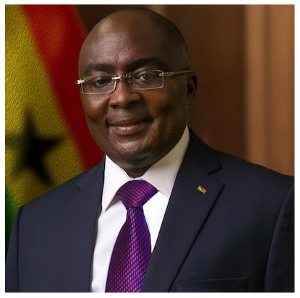Opinions of Sunday, 4 February 2024
Columnist: Chris Atadika
Dr. Bawumia’s political brand is dead
I argue in this article that the political brand of Dr. Bawumia is dead. I assert this based on my analysis of his political brand since he emerged into the political scene in 2007. Using the product life cycle model in marketing, I highlight key moments, events, and activities that represent stages his political brand has transitioned in and out of from 2007-2023.
The product life cycle is a term that describes the time frame from when a product is introduced into a market till it is removed from the market. For example, if a product is introduced to a market from January 2023 and it is made available in retail stores for consumers to purchase and by the end of March 2023, the production of the product seizes and the product is removed from the market, then the product life cycle of that product is 3 months.
To understand the various stages a product goes through from the time it is introduced into the market to the time it exits, the product life cycle model was proposed. This model is used in marketing management for strategy formulation and implementation. It guides one to know what to do and when to do it for the sustainability and profitability of the product. The product life cycle model advances that there are four stages in a product’s life cycle. They are the introduction stage, growth stage, maturity stage, and the decline stage.
The introduction stage is characterised by the newness of the product in the market, therefore there needs to be focused investment into distribution and promotion to create awareness of product to boost sales. The next stage is the growth stage which is characterized by increasing demand for the product because the product becomes more popular in the market, hence an increase in production to meet increased demand. The maturity stage is the next stage, and it is characterized by increased profitability and market share but increased competition and market saturation.
The last stage is the decline stage which is characterized by decreasing
sales and loss of market share because competition has outcompeted the product with alternatives. When a product gets to the decline stage, it is usually taken off the market, but some rebranding and product extension strategies can be implemented to rejuvenate or revive the brand.
The product life cycle model applies to political products like candidates. Dr Bawumia is a political brand that has been positioned in the Ghanaian political market over the period 2017-2023 to become Vice President. The brand has been successful at that after two attempts and Dr Bawumia is currently the Vice President of Ghana. However, his brand has gone through several stages of the political brand life cycle.
Introduction stage:
The political brand Dr Bawumia was first introduced into the political market in 2007 as the running mate of the then flagbearer of the opposition party, New Patriotic Party (NPP), Nana Addo Dankwa Akufo-Addo. Dr Bawumia had to resign as the Deputy Governor of the central bank, Bank of Ghana to occupy the running mate role to win the election in 2008. He was new in the political market with little to no partisan political experience therefore, a lot of focus went into creating awareness of who he was and what he brought on board as a perfect pair for flagbearer, Nana Addo Dankwa Akufo-Addo. His brand had to be promoted for the acceptance of both party members and the general Ghanaian voting populace.
Growth stage:
After losing the 2008 election, the Dr Bawumia political brand developed into its growth stage where his name became a household name in the NPP. He had learned the ropes of good public speaking, notable media interview skills, and appreciable campaign skills. The rank and file of the NPP grew in love for him and gained more confidence in him and his candidacy approaching the election of 2012. After the National Democratic Congress (NDC) was declared the winner of the 2012 election, the NPP decided to contest the decision of the Electoral Commission (EC) in court. The election petition of election 2012 in court was one of the events in his political brand lifecycle that projected Dr Bawumia’s political brand. He was the star of the show with his remarkable responses when he was been cross-examined several times during the proceedings. This rapidly grew his political brand in the Ghanaian political market as he was seen as the darling boy of the NPP.
Maturity stage:,/b>
After the verdict of the court that did not go in favour of the NPP, Dr. Bawumia intensified his pressure on the government with his economic lectures leading into the election of 2016. This ushered his political brand into its maturity stage. He was in almost every news report from 2014 to 2015 criticising the government, exposing inefficiencies in governance, and proposing solutions by making promises of what the NPP will do under the leadership of Nana Addo Dankwa Akufo-Addo and him when they win power in the election 2016. He was nicknamed the ‘Economic Wizkid’ and touted as the messiah to come and save the economy. He was a major contributor to the NPP’s victory in the 2016 election.
Decline stage:
Dr. Bawumia's brand started to decline when brand dissonance occurred in 2017. Brand dissonance is a state where a brand makes a promise and is not able to deliver it. The majority of the promises Dr Bawumia made during his campaign before 2016 have not been delivered and this has caused many negative reactions and public sentiments against his brand. He has also made several claims during this period that have been fact-checked by fact-checked media organizations and verdicts indicating misrepresentation of facts. These things over the years have hurt the Dr. Bawumia brand and caused it to sharply decline.
Based on these highlighted events and activities elaborated on Dr Bawumia’s political brand since he emerged into the Ghanaian political market, I conclude that his political brand is dead. His possible victory in the NPP primaries may rejuvenate his brand.
The question to be asked is, will he be able to revive his political brand to strategically position himself for victory in the election of 2024 if he is given the nod to lead the NPP?













